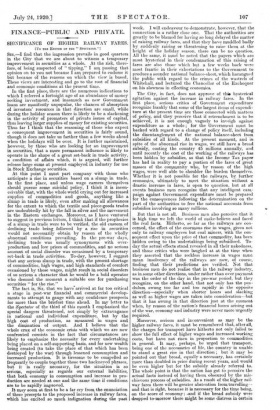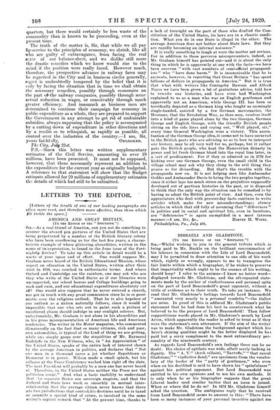FINANCE—PUBLIC AND PRIVATE.
SIGNIFICANCE OF HIGHER RAILWAY FARES. ET° THE EDITOR OF THE "SPECTATOR."] SilL,-I find that the impression prevails in good quarters in the City that we are about to witness a temporary improvement in securities as a whole. At the risk, there- fore, of being suspected of "tipping," I am passing that opinion on to you not because I am prepared to endorse it but because of the reasons on which the view is based. These views are interesting and go to the root of financial and economic conditions at the present time.
In the first place, there are the numerous indications to which I referred a fortnight ago of an abundance of money seeking investment, and inasmuch as new Government loans are manifestly unpopular, the chances of absorption of investors' resources in that direction are small, while during the holiday season there is likely to be a slackening in the activity of promoters of private issues of capital, thus leaving larger supplies of money for existing securities. Thus far I think that the reasoning of those who expect a consequent improvement in securities is fairly sound, though it does not take us farther than a few weeks ahead when the holidays will be over. It is further maintained, however, by those who are looking for an improvement in securities, that a more permanent influence is likely to operate in the shape of a great set-back in trade activity, a condition of affairs which, it is argued, will further release large sums at present employed in industry for use in Stock Exchange securities. At this point I must part company with those who anticipate a rise in securities based on a slump in trade. In the first place, and unless wage earners themselves should pursue some suicidal policy, I think it is incon- ceivable that, with the whole world crying out for increased supplies of commodities and goods, anything like a slump in trade is likely, even after making all allowances for the extent to which the textile and piece-goods trades are undoubtedly hit by the fall in silver and the movement in the Eastern exchanges. Moreover, as I have ventured to suggest in previous letters, I think that if the prophecies of a slump in trade were to be verified, the old custom of declining trade being followed by a rise in securities would not necessarily obtain by reason of the wholly abnormal conditions prevailing. In the pre-war days, declining trade was usually synonymous with over- production and low prices of commodities, and no serious amount of social disorder was occasioned by a temporary set-back in trade activities. To-day, however, I suggest that any serious slump in trade, with the present shortage of commodities, high wages, and high standards of comfort occasioned by those wages, might result in social disorders of so serious a character that he would be a bold operator who deemed the moment a suitable one for purchasing securities " for the rise."
The fact is, Sir, that we have arrived at far too critical a stage in post-war financial and commercial develop- ments to attempt to gauge with any confidence prospects for more than the briefest time ahead. In my letter to the Spectator of the third of this month I emphasized the special dangers threatened, not simply by extravagance in national and individual expenditure, but by the high cost of production, as measured in wages and the diminution of output. And I believe that the whole crux of the economic crisis with which we are now confronted consists in the fact that circumstances are likely to emphasize the necessity for every undertaking being placed on a self-supporting basis, and for new wealth being created (to take the place of that which has been destroyed by the war) through lessened consumption and. increased production. It is tiresome to be compelled so frequently to couple together those two hackneyed phrases, but it is really necessary, for the situation is so serious, especially as regards our external liabilities, that both economy in consumption and increase in pro- duction are needed at one and the same time if conditions are to be rapidly improved. It may seem at first to be a far cry from the enunciation of these precepts to the proposed increase in railway fares, which has excited so much indignation during the past week. I will endeavour to demonstrate, however, that the connection is a rather close one. That the authorities are greatly to be blamed for having so long delayed the matter of raising railway fares, and that they have muddled badly by suddenly raising or threatening to raise them at the height of the holiday season, there can be no question. All the same, it must be noted that the papers which are most hysterical in their condemnation of this raising of fares are also those which but a few weeks back were most frantic in their exhortations to the Government to produce a sounder national balance-sheet, which harangued the public with regard to the crimes of the wastrels of Whitehall, and lectured the Chancellor of the Exchequer on his slowness in effecting economies.
The City, in fact, does not approve of thie hysterical agitation against the increase in railway fares. In the first place, serious critics of Government expenditure recognize frankly that some of the largest items of expendi- ture at the present time are those connected with matters of policy, and they perceive that if retrenchment is to be achieved, it is not enough vaguely to inveigh against expenditure as a whole ; for the Government must be backed with regard to a change of policy itself, including the disentanglement of the national balance-sheet from subsidies of all kinds. At the present moment, and in spite of the abnormal rise in wages, we still have a bread subsidy, costing the country 45 millions annually, and until recently the cost of the working of the railways has been hidden by subsidies, so that the Income Tax payer has had in reality to pay a portion of the fares of great masses of the community who, by reason of the high wages, were well able to shoulder the burden themselves. Whether it is not possible for the railways, by further economies, ultimately to meet the situation without a drastic increase in fares, is open to question, but at all events business men recognize that any intelligent cam- paign against Government expenditure must be prepared for the consequences following the determination on the part of the authorities to free the national accounts from subsidies involving so many millions.
But that is not all. Business men also perceive that it is high time we left the world of make-believe and faced the real facts. Hitherto, so far as the railways are con- cerned, the effect of the enormous rise in wages, given not only to railway employees but coal miners, with the con- sequent effect upon the price of that commodity, has been hidden owing to the undertakings being subsidised. To- day the actual effects stand revealed in all their nakedness, and those critics who were laughed at at the time when they asserted that the reckless increase in wages must mean insolvency of the railways are now, of course, finding that their predictions are verified. Not that business men do not realise that in the railway industry, as in some other directions, under rather than over payment was the order of the day in the pre-war period, but they recognize, on the other hand, that not only has the pen- dulum swung too far and too rapidly in the opposite direction—especially when shorter hours and slacking as well as higher wages are taken into consideration—but that it has swung in that direction just at the moment when, by reason of the nation's financial losses arising out of the war, economy and industry were never more urgently required.
Moreover, serious and inconvenient as may be the higher railway fares, it must be remembered that, after all, the charges for transport have hitherto not only failed to show the full effect of higher wages and increased working costs, but have not risen in proportion to commodities in general. It may, perhaps, be urged that transport, being one of the necessaries of life, the country is unable to stand a great rise in that direction ; but it may be pointed out that bread, equally a necessary, has certainly more than doubled in price during recent years, and would be even higher but for the subsidy already referred to. The whole point is that the nation has got to perceive the actual facts instead of having them obscured by the mis- chievous process of subsidies. As a result of the higher rail- way fares there will be greater abstention from travelling— and. that is right, because it is necessary for the time being, on the score of economy; .and if the bread subsidy were dropped to-morrow there might be some distress in certain quarters, but there would certainly be less waste of the commodity than is known to be proceeding, even at the present time. The truth of the matter is, Sir, that while we all pay lip-service to the principles of economy, we shrink, like all who are guilty of extravagance, from facing the real state of our balance-sheet, and we dislike still more the drastic remedies which we know would rise to the mind if the position were really faced. However much, therefore, the prospective advance in railway fares may be regretted in the City and in business circles generally, regret is undoubtedly tempered by the belief that it is only by facing the situation that in time we shall obtain the necessary remedies, possibly through economies on the part (+the railway companies, possibly through some actual reduction in wages, or conceivably through much greater efficiency. And inasmuch as business men are determined to continue their campaign for economy in public expenditure as a whole, they are prepared to support the Government in any attempt to get rid of undesirable subsidies, always supposing that the policy is accompanied by a cutting down of expenditure in other directions and by a readin as to relinquish, as rapidly as possible, all control over the industries of the country.—I am, Sir, P.S.—Since this letter was written supplementary estimates Of the Civil Service, amounting to over 18 millions, have been presented. It must not be supposed, however, that these necessarily represent an addition to the expenditure for the current year as originally budgeted. A reference to that staternent will show that the Budget estimate allowed for 20 millions of supplementary estimates the details of which had still to be submitted.



































 Previous page
Previous page